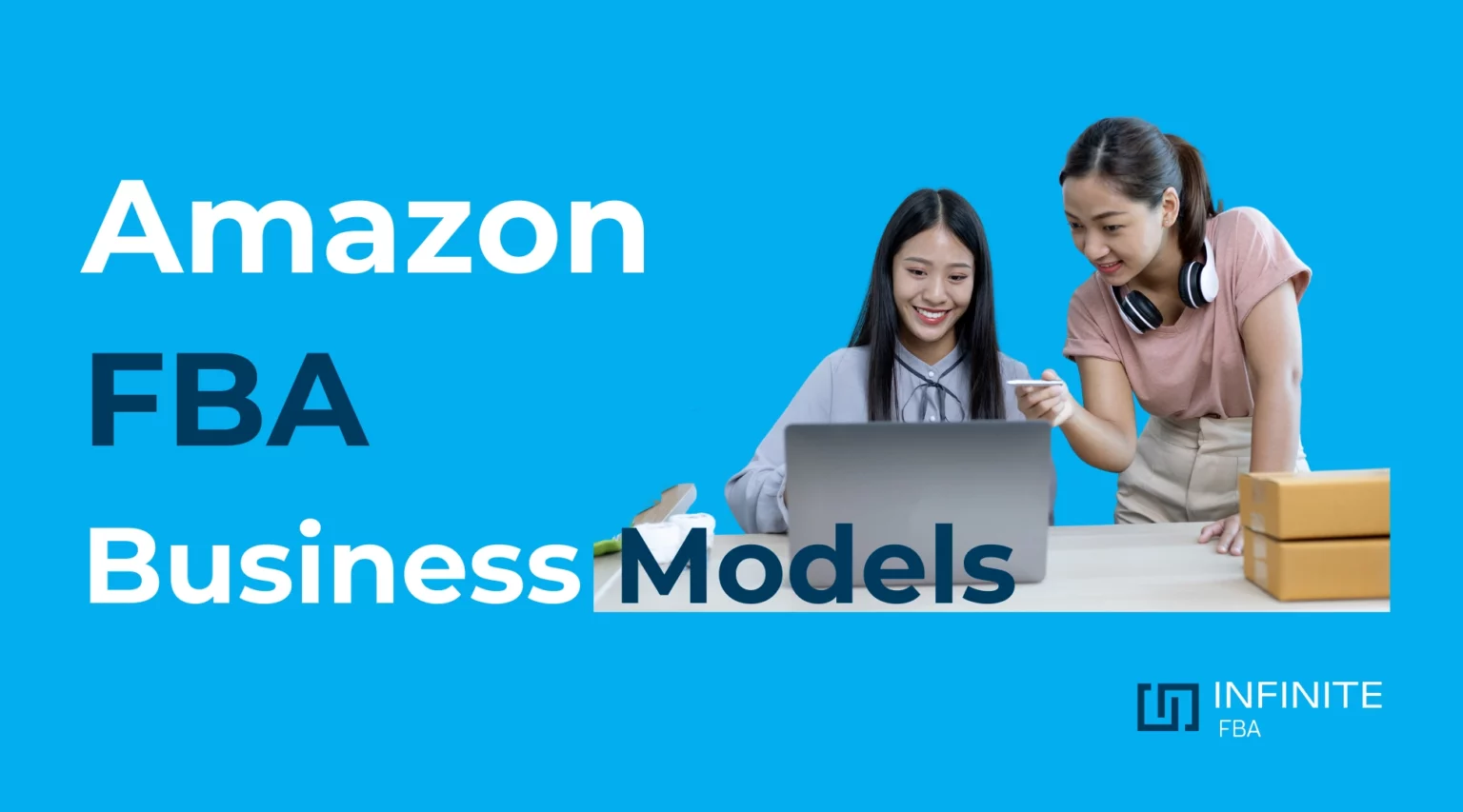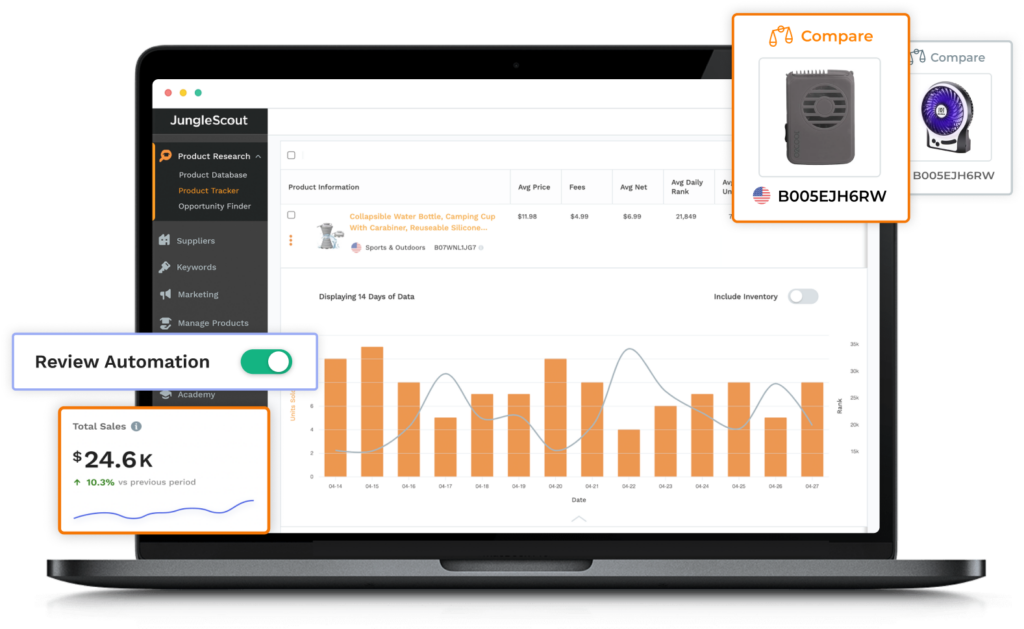With Amazon FBA, sellers can focus on what they do best – sourcing, marketing, and growing their business – while leaving the operational intricacies to the world’s leading online marketplace.
What makes the difference is its ability to accommodate diverse Amazon FBA business models, catering to the unique aspirations and approaches of entrepreneurs. Whether you envision building your own brand, spotting opportunities in retail landscapes, or curating captivating subscription boxes, Amazon FBA offers a platform to manifest your ambitions.
Let’s dive in and uncover the path that resonates with you, where your dreams can materialize and your business can flourish.
1. Amazon Private Label

In the realm of Amazon FBA, the private label business model stands tall as a pathway to building your own brand and unlocking untapped potential. Private label refers to the practice of sourcing generic products from manufacturers, branding them with your own label or logo, and selling them under your unique brand on the Amazon marketplace. This model allows you to create a distinct identity and establish a loyal customer base.
Steps involved in private label business model
A. Product research and selection
To embark on a successful private label venture, thorough product research and selection are paramount. Leverage powerful tools like Jungle Scout or Helium 10 to identify profitable product niches. Analyze market demand, competition, and sales trends to uncover opportunities. Seek out products that possess high demand, low competition, and the potential for long-term growth.
B. Finding manufacturers or suppliers
Finding reliable manufacturers or suppliers is a critical aspect of the private label model. Online platforms like Alibaba provide access to a vast network of manufacturers. Attend trade shows in your niche to establish direct connections. Alternatively, consider working with sourcing agents who can assist you in finding reputable suppliers. Focus on quality, reliability, and ethical business practices when choosing your manufacturing partner.
C. Branding and packaging
Branding and packaging are essential elements of the private label business model. Create a unique brand identity that resonates with your target audience. Develop a compelling logo, tagline, and brand story. Invest in appealing and professional packaging that reflects your brand’s values. Ensure product quality and consistency to instill trust in your customers.
D. Listing and optimizing product on Amazon
When it comes to selling your private label products on Amazon, effective listing optimization is key. Craft compelling product listings that highlight the unique features and benefits of your products. Optimize keywords and utilize relevant search terms to enhance discoverability. Utilize high-quality product images and engaging product descriptions to capture the attention of potential customers.
E. Marketing and promoting the product
To drive sales and boost visibility, a well-executed marketing strategy is crucial. Utilize various marketing techniques to promote your private label products. Leverage Amazon’s PPC (Pay-Per-Click) advertising platform to target relevant keywords and reach potential customers.
Embrace social media marketing to engage with your audience and build brand awareness. Collaborate with influencers in your niche to expand your reach and tap into their loyal followers. Take advantage of Amazon’s promotional tools, such as lightning deals or coupons, to attract customers and increase sales.
Pros and cons of private label
The private label business model offers numerous advantages for ambitious entrepreneurs. By creating your own brand, you have the opportunity to establish a unique market position, cultivate customer loyalty, and command higher profit margins. Private label also allows for scalability, as you can expand your product line and brand presence over time.
However, it’s important to acknowledge the challenges that come with private label. Thorough product research is essential to ensure you enter a profitable market. Initial investment in inventory and branding can be significant. Competition is fierce, requiring strategic differentiation and effective marketing to stand out.
Adapting to changing market trends and consumer preferences is crucial for long-term success. Despite these challenges, the private label model holds immense potential for those willing to invest the time, effort, and resources into building a successful brand.
2. Amazon Retail Arbitrage

In the realm of Amazon FBA, the retail arbitrage business model offers a thrilling opportunity to leverage price discrepancies and turn a profit. Retail arbitrage is the practice of sourcing products from retail stores at a lower price and reselling them on Amazon at a higher price, taking advantage of the pricing differences between the two platforms. By identifying undervalued products in retail environments, you can capitalize on the potential profit margins available on Amazon’s vast marketplace.
The process of retail arbitrage
A. Identifying profitable products
To succeed in retail arbitrage, the ability to identify products with significant price differences is key. Look for items that are priced lower in retail stores compared to their online selling prices. Explore clearance sections, end-of-season sales, or discontinued products that may present opportunities for arbitrage. Research and knowledge about market demand and pricing trends will help you make informed decisions.
B. Sourcing products from retail stores
Sourcing products for retail arbitrage can be an adventure in itself. Visit local retail stores, including big-box retailers, department stores, or specialty shops, and be on the lookout for products with attractive price differentials. Consider exploring thrift stores, liquidation centers, or even online marketplaces like Facebook Marketplace or Craigslist for potential deals. Establishing relationships with store managers or staff members can provide insights into upcoming sales or exclusive discounts.
C. Analyzing pricing discrepancies
Analyzing pricing discrepancies is crucial for success in retail arbitrage. Evaluate potential profit margins by factoring in Amazon fees, shipping costs, and other expenses. Ensure that after all expenses are accounted for, the product can still be sold at a competitive price on Amazon while yielding a desirable profit. Thorough research and diligent calculations will help you make informed decisions about which products are worth pursuing.
D. Listing and selling products on Amazon
Once you’ve sourced your products, it’s time to list and sell them on Amazon. Create compelling product listings that highlight the unique features and benefits of your items. Take high-quality product images and write engaging descriptions. Utilize Amazon’s FBA program for efficient fulfillment and customer service. Stay proactive in managing inventory to ensure consistent availability for potential customers.
Pros and cons of retail arbitrage
Retail arbitrage presents a range of advantages and challenges that aspiring entrepreneurs should consider.
Advantages of retail arbitrage include low startup costs, immediate product availability, and flexibility in sourcing. Unlike other business models, retail arbitrage allows you to start small without significant upfront investments.
The products are readily available in retail stores, allowing for quick acquisition and potential profitability. Additionally, retail arbitrage offers the flexibility to choose your sourcing locations and adjust your inventory based on market demand.
However, retail arbitrage also poses challenges. Limited product availability can sometimes make it challenging to consistently find profitable items. The competitive nature of the market requires thorough research and quick decision-making to secure the best deals.
Scalability can be a consideration as retail arbitrage relies on finding undervalued products, and as more sellers enter the market, opportunities may become scarcer. Additionally, retail arbitrage requires time and effort spent on sourcing, scanning, and analyzing products.
3. Amazon Online Arbitrage

In the vast landscape of Amazon FBA, the online arbitrage business model opens up a world of possibilities by harnessing the power of online retailers. Online arbitrage involves sourcing products from various online retailers at a lower price and reselling them on Amazon at a profitable margin. This model leverages the convenience and accessibility of online platforms to discover undervalued products that can be sold for a higher price on Amazon’s expansive marketplace.
Steps involved in online arbitrage
A. Identifying profitable deals online
To excel in online arbitrage, you must be adept at finding profitable deals online. Utilize powerful tools like Tactical Arbitrage or Keepa to identify online deals, discounts, or sales. These tools can help you identify products with significant price discrepancies, allowing you to seize opportunities for arbitrage.
B. Sourcing products from online retailers
Online arbitrage provides access to a wide array of online retailers and marketplaces. Popular online marketplaces such as eBay, Walmart, or Best Buy can serve as fertile grounds for sourcing discounted products. Explore retail websites, deal forums, or even social media platforms where sellers share exclusive deals and promotions. By monitoring these sources diligently, you can uncover hidden gems and undervalued products.
C. Evaluating pricing and profitability
Evaluate the pricing and profitability of potential products before making sourcing decisions. Calculate potential profits by factoring in Amazon fees, shipping costs, and other expenses. Analyze sales ranks, historical data, and customer reviews to assess demand and sales potential. By conducting thorough research and analysis, you can make informed decisions about which products are worth sourcing and reselling.
D. Listing and selling products on Amazon
Once you have sourced your products, it’s time to list and sell them on Amazon. Create compelling product listings that highlight the unique features and benefits of the items. Optimize your listings with relevant keywords to improve visibility and attract potential buyers. Leverage Amazon’s FBA program to streamline fulfillment and customer service. Stay vigilant in managing inventory to ensure smooth operations and satisfied customers.
Pros and cons of online arbitrage
Online arbitrage presents unique advantages and challenges that entrepreneurs should consider.
Advantages of online arbitrage include access to a wide range of products across numerous online retailers and marketplaces. The online landscape offers a vast selection of discounted products, providing ample opportunities for profitable arbitrage.
Online sourcing also allows for scalability, as there is a virtually unlimited number of potential deals and products to explore.
However, online arbitrage comes with its own set of challenges. Fierce competition is a key consideration, as more sellers have access to the same online retailers and marketplaces.
Price fluctuations can occur rapidly in the online space, requiring vigilant monitoring and quick decision-making. Additionally, product availability may be limited due to the high demand for discounted items.
4. Amazon Wholesale

Within the realm of Amazon FBA, the wholesale business model offers a gateway to established brands and the potential for lucrative partnerships. Wholesale involves sourcing products in bulk directly from authorized distributors or manufacturers and reselling them on Amazon. By collaborating with authorized suppliers, you can tap into a wide array of trusted brands and leverage economies of scale to drive your business forward.
The process of the wholesale business model
Finding authorized distributors or manufacturers
Establishing relationships with wholesalers is a vital aspect of the wholesale model. Explore avenues such as attending trade shows and industry events where you can connect with distributors. Utilize wholesale directories, both online and offline, to identify potential partners.
Additionally, consider reaching out to brands directly to inquire about wholesale opportunities. Building these connections opens doors to a wide range of products from reputable sources.
Negotiating pricing and terms
Negotiation skills play a crucial role in the wholesale model. Seek favorable pricing and terms from distributors or manufacturers. Aim to secure competitive prices, flexible minimum order quantities (MOQs), and potentially exclusive distribution agreements. Establishing mutually beneficial partnerships can result in long-term success and a competitive edge.
Purchasing products in bulk
Once you’ve established relationships with wholesalers, it’s time to navigate the logistics of purchasing products in bulk. Place orders with authorized distributors or manufacturers and coordinate the logistics of importing and receiving the inventory. Efficiently manage the ordering process, ensuring timely deliveries and maintaining effective communication with your suppliers.
Preparing inventory for Amazon FBA
To utilize Amazon’s FBA program, proper preparation of your wholesale inventory is crucial. Pay attention to packaging requirements and adhere to Amazon’s guidelines. Label products accurately, ensuring they meet Amazon’s labeling standards. Organize your inventory efficiently, allowing for easy identification and smooth handling within Amazon’s fulfillment centers.
Listing and selling wholesale products on Amazon
Creating compelling product listings and optimizing content are vital steps to thrive in the wholesale space on Amazon. Craft accurate and persuasive product descriptions that showcase the unique features and benefits of the products.
Utilize relevant keywords to improve discoverability and attract potential buyers. Compete effectively with other sellers by continuously monitoring and optimizing your listings to stay ahead.
Pros and cons of the wholesale model
The wholesale model presents distinct advantages and challenges that entrepreneurs should consider.
Advantages of the wholesale model include access to established brands, allowing you to tap into existing consumer trust and recognition. Economies of scale can lead to higher profit margins as you purchase products in bulk at discounted prices. Establishing long-term partnerships with reliable distributors or manufacturers opens doors to exclusive deals and better pricing arrangements.
However, the wholesale model is not without its challenges. Higher upfront costs are involved due to the need to purchase products in bulk. Increased competition can make it more challenging to differentiate your offerings and maintain profit margins.
Effective inventory management becomes crucial to ensure smooth operations and avoid excess stock or shortages.
Key Takeaways
Throughout this comprehensive guide, we have explored the diverse array of Amazon FBA business models, each offering unique opportunities and avenues for success.
- The private label business model enables you to create and sell products under your own brand, fostering brand building and higher profit margins.
- Retail arbitrage capitalizes on price discrepancies, allowing you to source products from retail stores and resell them for a profit.
- Online arbitrage harnesses the power of online retailers to find discounted products that can be resold on Amazon.
- Wholesale grants access to established brands and the potential for long-term partnerships.
- Dropshipping provides flexibility and a wide product selection without the need for inventory management.
- Bundling offers the opportunity to create unique combinations of complementary products.
- Subscription boxes foster recurring revenue and customer loyalty.
Now armed with knowledge about these different business models, it’s time to take action and embark on your Amazon FBA journey. The Amazon FBA ecosystem is thriving, with countless success stories of entrepreneurs who have built thriving businesses.
By leveraging the power of e-commerce, you can tap into a global marketplace, reach millions of customers, and create a sustainable income stream. Let the possibilities and success stories within the Amazon FBA ecosystem inspire and motivate you to pursue your dreams.
Remember, your Amazon FBA business is a reflection of your passion, dedication, and entrepreneurial spirit. Embrace the chosen business model that resonates with you, leverage the resources available, and take consistent action. The world of Amazon FBA awaits, and your journey to success starts now.











